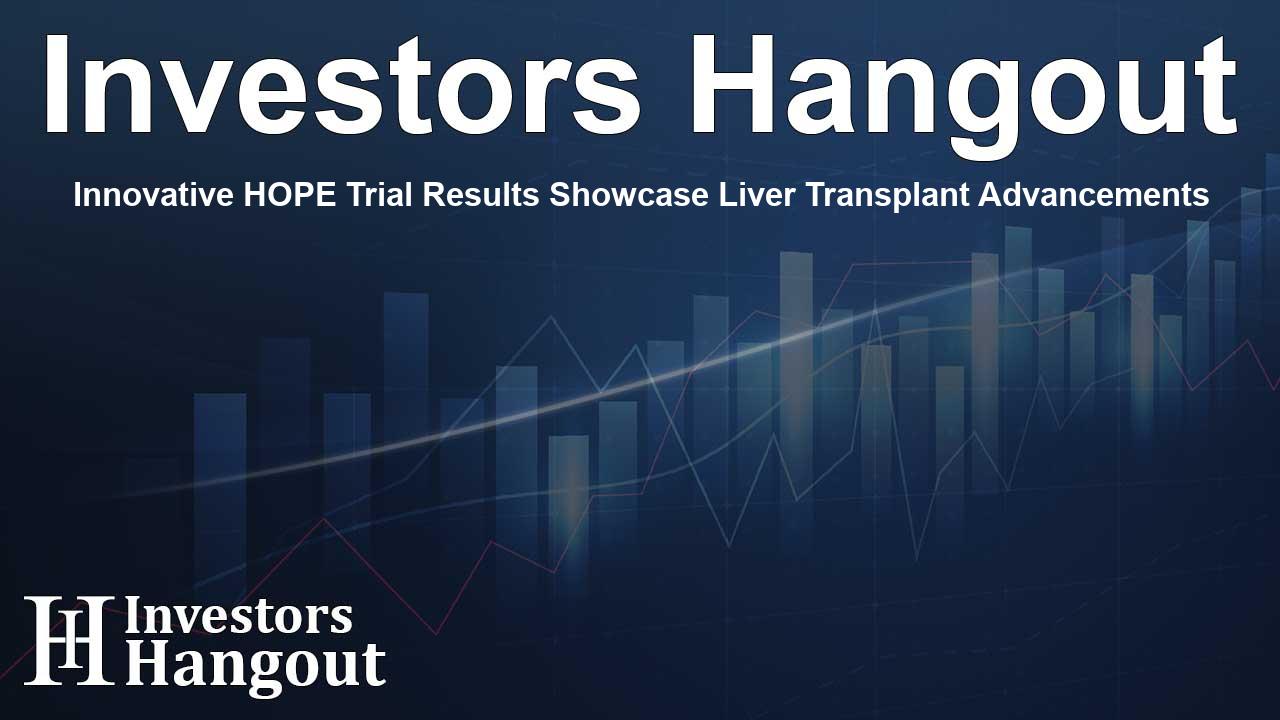Innovative HOPE Trial Results Showcase Liver Transplant Advancements

Breakthroughs in Liver Transplantation
At the heart of new advancements in liver transplantation is the groundbreaking research presented at the World Transplant Congress. The recent analyses from the pivotal Bridge to HOPE trial highlight the transformative potential of Hypothermic Oxygenated Perfusion (HOPE) technology. This innovative method not only enhances patient care but significantly cuts costs associated with liver transplants.
Significant Findings from the Bridge to HOPE Trial
During the Congress, experts unveiled data that illustrates HOPE's ability to reduce the cost of liver transplantation by shortening initial hospital stays. This approach decreases the frequency of late complications that typically burden both patients and healthcare systems. The findings indicate that HOPE is associated with a reduced risk of severe organ rejection compared to traditional practices.
Economic Impact
The economic implications of the HOPE trial are profound. Results from comprehensive analyses revealed that utilizing HOPE alongside the VitaSmart™ Perfusion System can lead to substantial savings for hospitals without sacrificing quality of care. Compared to conventional static cold storage methods, the initial hospitalization for liver transplants using HOPE was reduced from an average of 12.9 days to just 10.8 days. Such a decrease not only lowers healthcare costs but also minimizes the patient's recovery time.
Clinical Outcomes
In evaluating organ rejection rates, the data demonstrated a stark contrast between HOPE and standard practices. Moderate to severe biopsy-proven organ rejection occurred in only 32% of HOPE-treated patients, while the rate soared to 67% in those who received standard care. This clear advantage emphasizes HOPE's potential to mitigate the risk of severe complications and enhance overall patient outcomes.
Expert Insights
Highlighting the importance of these findings, Don Webber, the CEO of Bridge to Life Ltd., shared his perspective on the significance of their commitment to improving healthcare outcomes. As the trial sponsor, Bridge to Life is dedicated to partnering with Transplant Centers and organ procurement organizations to further lower care costs while ensuring quality patient experiences. The emphasis on lowering the total cost of care while enhancing outcomes illustrates the company's holistic approach to transplantation.
Future Research Directions
The compelling results from the Bridge to HOPE trial raise questions for future research endeavors. Investigating the nuances of HOPE technology's immunomodulatory effects is essential to expanding its application. With less severe organ rejection noted in HOPE therapies, further studies could elucidate the underlying mechanisms at play and offer additional insights into improving liver transplantation techniques.
About Bridge to Life Ltd
Bridge to Life Ltd stands as a leader in developing organ preservation solutions, offering innovative products such as Belzer UW®, EasiSlush®, and the VitaSmart™ Hypothermic Oxygenated Perfusion System. Their commitment to quality and innovation ensures that they remain at the forefront of transplantation advancements, partnering with leading institutes globally to optimize organ preservation strategies.
Frequently Asked Questions
What is the HOPE trial, and what were its main findings?
The HOPE trial investigates the effects of Hypothermic Oxygenated Perfusion on liver transplantation, showing significant reductions in hospital stay and organ rejection rates.
How does HOPE technology benefit liver transplant patients?
HOPE technology shortens hospital stays and lowers complications, enhancing overall patient outcomes while reducing healthcare costs.
What role did Bridge to Life Ltd play in this research?
Bridge to Life Ltd is the sponsor of the Bridge to HOPE trial and aims to improve transplant procedures and outcomes through innovative solutions.
What are the economic implications of using HOPE?
Using HOPE has been associated with reduced hospital costs, fewer complications, and overall savings in the healthcare system.
What future research directions are suggested by these findings?
Further research is needed to investigate the immunomodulatory benefits of HOPE technology in liver transplantation.
About The Author
Contact Dominic Sanders privately here. Or send an email with ATTN: Dominic Sanders as the subject to contact@investorshangout.com.
About Investors Hangout
Investors Hangout is a leading online stock forum for financial discussion and learning, offering a wide range of free tools and resources. It draws in traders of all levels, who exchange market knowledge, investigate trading tactics, and keep an eye on industry developments in real time. Featuring financial articles, stock message boards, quotes, charts, company profiles, and live news updates. Through cooperative learning and a wealth of informational resources, it helps users from novices creating their first portfolios to experts honing their techniques. Join Investors Hangout today: https://investorshangout.com/
The content of this article is based on factual, publicly available information and does not represent legal, financial, or investment advice. Investors Hangout does not offer financial advice, and the author is not a licensed financial advisor. Consult a qualified advisor before making any financial or investment decisions based on this article. This article should not be considered advice to purchase, sell, or hold any securities or other investments. If any of the material provided here is inaccurate, please contact us for corrections.
